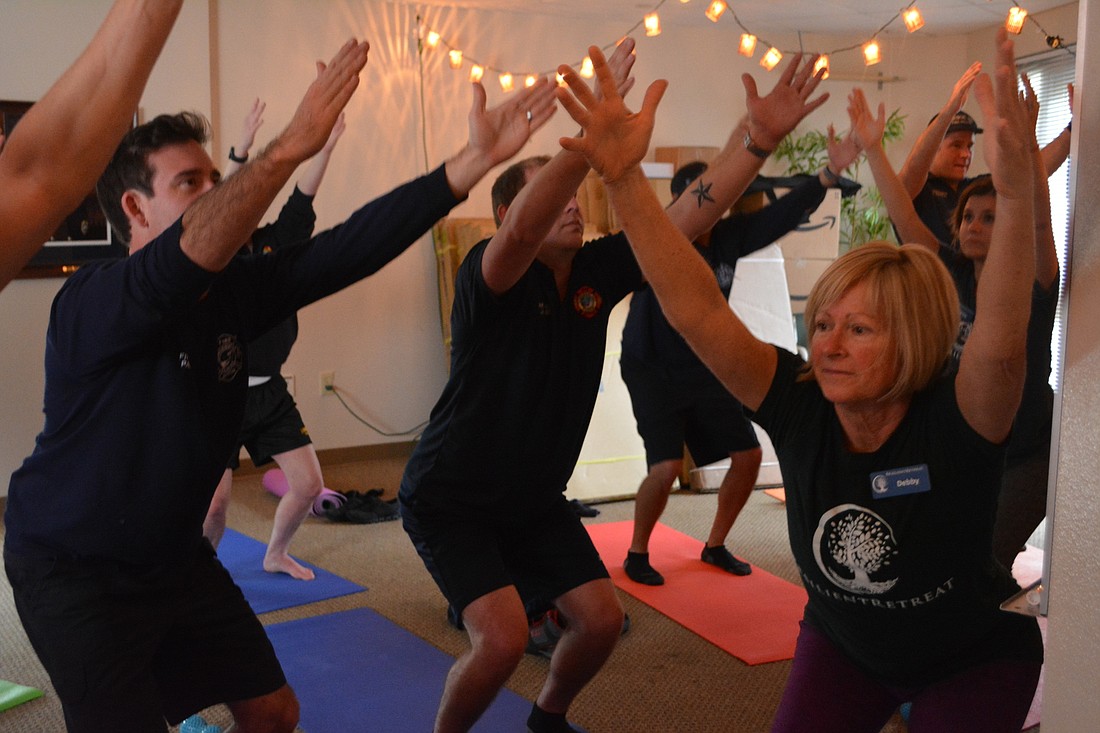- January 1, 2025
-
-
Loading

Loading

“Inhale up over your head and straighten your front leg. Take a big breath, straighten your front leg. Exhale, back and looking over your front arm. Yeah,” Debby McClung said rhythmically. “Turn your palm up, let’s do that again. Inhale, rise. Exhale, down. Look over your front arm. Powerful posture.”
These aren’t words you expect to hear in a fire station. But such words of instruction and encouragement were heard often during a five-session yoga class, spanning five weeks, that was conducted at Longboat Key's north fire station.
McClung, the owner of Feel Good Yoga & Massage and a yoga instructor, and Sidney Turner, a psychologist and the founder of Resilient Retreat, teamed up to offer the class to some firefighters. They aimed to discover if yoga would have any positive effects on stress-related symptoms Longboat firefighters feel largely because of their line of work.
Longboat Key Fire Rescue Department Chief Paul Dezzi takes mental health issues seriously. When he found out about Resilient Retreat, Turner's nonprofit that provides free, confidential services to abuse survivors as well as first responders and others who are exposed to trauma at work, he was immediately interested. Firefighters are exposed to stress on a regular basis, often multiple times a day. It can be hard for their bodies to turn off the fight-or-flight response. This can be damaging over time.
“Think about it as two different nervous systems and one gets triggered on when it's an emergency, and one gets triggered on when it's time to calm down,” Turner said. “And sometimes when you're experiencing a lot of stress and you develop something like PTSD from having chronic stress all the time, learning to turn on [the one that helps you calm down] is really helpful, because sometimes your body can get stuck in the same way of handling things. … A lot of people really struggle to sleep at night, to just function normally.”
After talking with Dezzi, Turner teamed up with McClung to offer a class to Longboat firefighters during their shifts. Each method of treatment — yoga, painting, etc. — works differently for each mental health issue, and every individual’s body responds to those forms of treatment in unique ways. So it’s safe to say not every single firefighter walked away from the class with a new favorite hobby. That being said, the results turned out mostly positive.
Some firefighters had to miss sessions to answer calls or because they were sick, making the data gathered from surveys difficult to analyze as a whole. However, participants on average recorded lower levels of stress, less work missed due to physical health or stress and said they felt healthier.
One firefighter wrote: “I came into yoga thinking it was just another task give[n] that needed to be completed. I was taken back by the ability it gave to destress and open my mind [to things other than] work and stress. I finished my five classes of yoga with a new respect for the craft and exercise. It is something different then the competitive nature firefighters find themselves in. Allows self-reflection when our job is inherently focused on others."
Another added: “Work’s been stressful lately and yoga has been the thing I’ve looked forward to the most. It gives me time out of the day to slow down and relax. It makes me less anxious.”
Turner said some of the firefighters didn’t take yoga as seriously during the first session. For most, that attitude changed quickly. A few weeks after the class started, a session was canceled. Some of the first responders made sure to tell McClung at the next session how sad they were about the cancelation.
“They weren’t so sure about it at first,” Turner said, “but [I thought it was interesting] just how many of them really loved it at the end.”